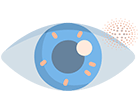Arbabi, A., Liu, A., & Ameri, H. (2019). Gene Therapy for Inherited Retinal Degeneration. Journal of ocular pharmacology and therapeutics : the official journal of the Association for Ocular Pharmacology and Therapeutics, 35(2), 79–97. https://doi.org/10.1089/jop.2018.0087
Scholl, H. P., Strauss, R. W., Singh, M. S., Dalkara, D., Roska, B., Picaud, S., & Sahel, J. A. (2016). Emerging therapies for inherited retinal degeneration. Science translational medicine, 8(368), 368rv6. https://doi.org/10.1126/scitranslmed.aaf2838
Francis P. J. (2006). Genetics of inherited retinal disease. Journal of the Royal Society of Medicine, 99(4), 189–191. https://doi.org/10.1258/jrsm.99.4.189
Apte R. S. (2018). Gene Therapy for Retinal Degeneration. Cell, 173(1), 5. https://doi.org/10.1016/j.cell.2018.03.021
Takahashi, V., Takiuti, J. T., Jauregui, R., & Tsang, S. H. (2018). Gene therapy in inherited retinal degenerative diseases, a review. Ophthalmic genetics, 39(5), 560–568. https://doi.org/10.1080/13816810.2018.1495745
Stone, E. M., Andorf, J. L., Whitmore, S. S., DeLuca, A. P., Giacalone, J. C., Streb, L. M., Braun, T. A., Mullins, R. F., Scheetz, T. E., Sheffield, V. C., & Tucker, B. A. (2017). Clinically Focused Molecular Investigation of 1000 Consecutive Families with Inherited Retinal Disease. Ophthalmology, 124(9), 1314–1331. https://doi.org/10.1016/j.ophtha.2017.04.008





